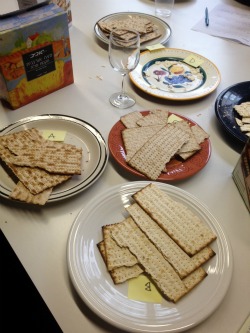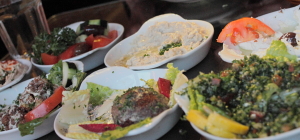If I had to offer you one piece of advice on Seder going, it’d be this: Don’t go hungry. Even in my family’s significantly…abridged version, you’re a good hour and two glasses of wine in before you see solid food. Tonight being the first night of Passover, one of the most important Jewish holidays (and definitely the tastiest), there’ll be a lot of Seders going on. If you’re lucky enough to snag an invite, you’ll want to read through this and bone up on your Seder knowledge. If you didn’t get an invite, here’s a hint: the holiday is all about welcoming everyone into your home, so lay the pressure on a friend. Or, if you’re really hard up, find a door left open for the prophet Elijah (part of the Passover tradition) and wander in. Read on for a bit of what you’ll want to know to be prepared:
Matzoh ball density preference is an extremely personal thing. Here’s the thing: some people like floaters, and some like sinkers. It’s like Yankees vs. Mets: there is no middle ground. If you get served a ball of fluff in your soup and you’re a sinker kind of person, it’s fine, just take note and make sure you don’t forget next time check ahead of time with any potential Seder hosts. If you’re a floater kind of person, no problem. Just be so kind as to escort yourself out of my house. Now.
Matzoh is not awesome. Oh, your friend Rivka once spread some peanut butter on a piece and you ate it and it was delicious? That’s great. Don’t tell me about it, though. Eat matzoh for seven straight days–and clean up the omni-present accompanying crumbs–then you may give me all of your input on the awesomeness of matzoh. I will not be holding my breath. None of that new-fangled fancy-flavored matzoh, either: that’s cheating.
This one’s a matzoh ball, that one’s gefilte fish. Sure, they’re one course after the other, and they’re both blandish, beige balls of mashed up foodstuff, but they’re not the same thing. And, while we’re on the topic, yes, there are some people who like gefilte fish. Even (especially) when it comes straight out of the jar with the weird gobs of fish jelly sticking to the sides. To each his own. There are also some who like Manischewitz, the sickly-sweet grape juice that serious wine people think is some sort of practical joke. Remember, many Jews have been drinking it since a very young age (Judiasm, unlike America, doesn’t have puritanical drinking ages) and nobody’s developed a taste for champagne by the 2nd grade. It’s a nostalgia thing.
Macarons vs. Macaroons: Sadly, this is not the Jewish holiday where we sit around eating Parisian almond cookies (though if you find that one, please let me know). Macaroons are hideously dense coconut cookies that may or may not include stale cardboard as an ingredient. Along with a version of flourless chocolate cake from pre-trendiness times, it is a ubiquitous Seder dessert. For the sake of future Jews with taste buds, I will now list for you and them, other desserts which are Passover safe: sorbet, meringue, pavlova (a magical dish that includes both the two prior items), good chocolate bars, baked apples with caramel sauce, coconut rice pudding (depending–see #5), buckeyes, chocolate dessert fondue, poached pears, granita, nut brittle, and, in fact, even the macaron itself (mostly made of egg whites and almond flour) has no reason to not be Passover safe. There is no reason for bad Passover dessert. Someone please tell that to the 80’s and redeem my childhood Seders.
On matzoh BLTs and bacon brussels sprouts: Many Jews who don’t keep kosher the rest of the year do adhere to some or all of the Passover restrictions, leading to the decidedly un-kosher Passover concoctions listed here, as well as things like pepperoni matzoh pizza, all true examples from friends. Like floaters versus sinkers (matzoh balls, of course), it’s simply a personal decision. A Sephardic Jew (from Spain and North Africa) will likely eat rice, while an Ashkenazi (Eastern European) one might not–because it (and corn, too) looks like something that might have once leavened (risen). Ironically, that even means corn in other substances, such as high fructose corn syrup is verboten. Coke produces yellow-capped “Passover Coke” sweetened with cane sugar to make sure no Jew has to go without soda for a week (thank God!) We all have our own ways to decide what to eat or not eat, so maybe just don’t ask so many questions, and pass the Maneschewitz, okay?
Follow Voracious on Facebook & Twitter. Find more from Naomi Bishop on her blog, The GastroGnome, or on Twitter.








